Stormont talks: Talks to restore devolution back under way
- Published
- comments
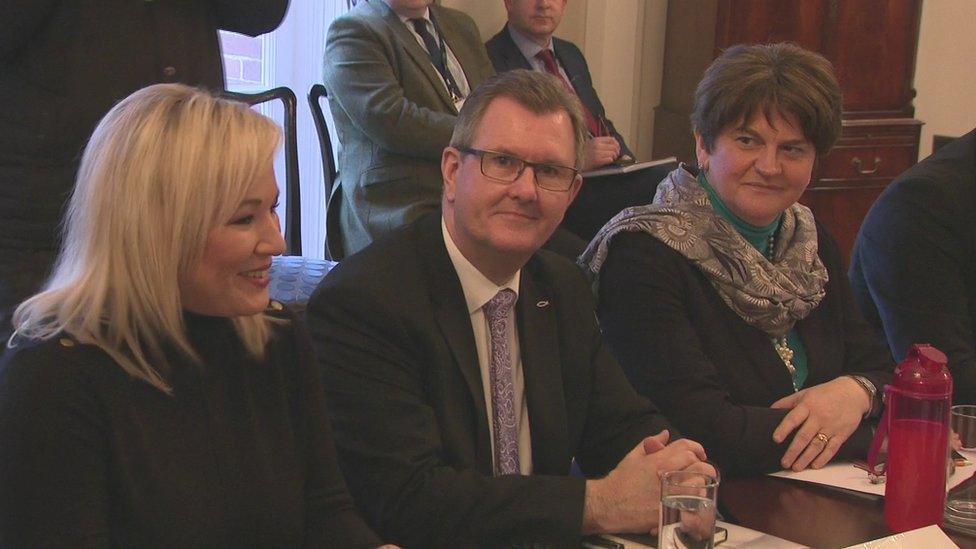
Sinn Féin deputy leader Michelle O'Neill, DUP MP Sir Jeffrey Donaldson and DUP leader Arlene Foster at roundtable talks on Thursday
Talks aimed at breaking almost three years of political deadlock in Northern Ireland have resumed.
Discussions were paused over the Christmas holidays after the Democratic Unionist Party (DUP) was accused of holding up a deal.
Devolved government has been inactive since January 2017, when the DUP and Sinn Féin split in a bitter row.
Parties have until 13 January to reach agreement or a new assembly election could be called.
The DUP and Sinn Féin held separate meetings with Northern Ireland Secretary Julian Smith, before a roundtable with the other Stormont parties and the Irish government.
Other meetings between the parties took place throughout the day.
Sinn Féin negotiator Conor Murphy said he believes a deal to restore Stormont can be reached soon.
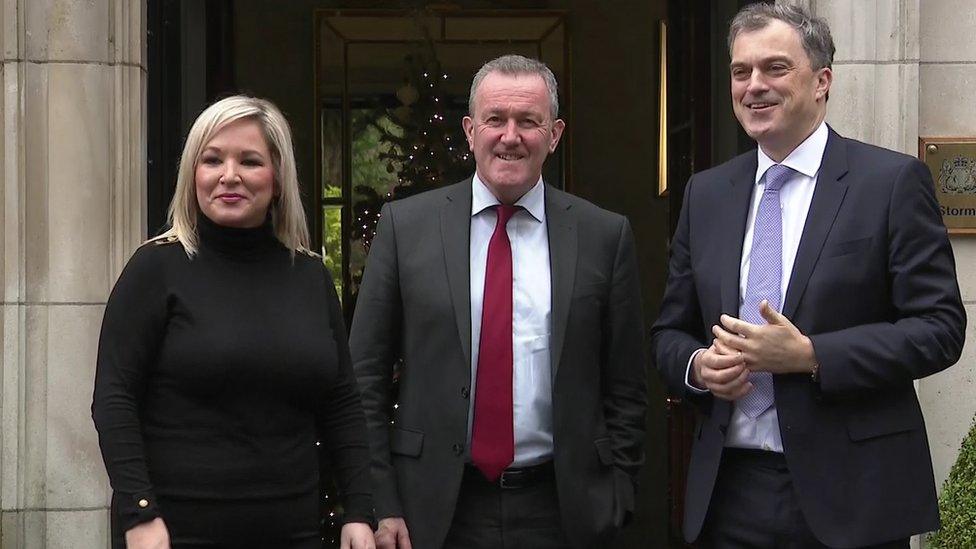
Sinn Féin's Michelle O'Neill and Conor Murphy with the secretary of state on Thursday
Speaking after an all-party roundtable, he said he did not see "any need to run this down to the wire".
He said the issues had all been rehearsed and what is now needed is fresh political will.
Mr Murphy said he hoped there would now be "one final push" to get all parties on board for an agreement.
DUP MP Sir Jeffrey Donaldson said talks had been constructive but the parties must avoid a "quick fix".
"I think that there's a willingness from all the parties to get a deal," he said.
"For our part, the DUP is absolutely determined to get this right."
He said the parties and two governments were not in a position to publish a draft agreement text and would not agree a deal because of a looming deadline.
He also said his party favoured reforming and retaining the petition of concern, the assembly's controversial veto system, echoing comments made by party leader Arlene Foster on the Good Morning Ulster programme on Thursday.
The petition is aimed at ensuring legislation cannot pass without cross-community support, but has faced accusations of misuse in the past.
He said all parties "agree it should be retained as an important safeguard".

Analysis: Election could be looming
By Jayne McCormack, BBC News NI Political Reporter
The Stormont parties have just 12 days to reach a deal, otherwise Northern Ireland Secretary Julian Smith has insisted the only other option is another election.
While that has also been a warning from previous secretaries of state, this time it does not appear to be an empty threat.
It's understood the basis of an agreement is there which will require all parties to get quickly on board.
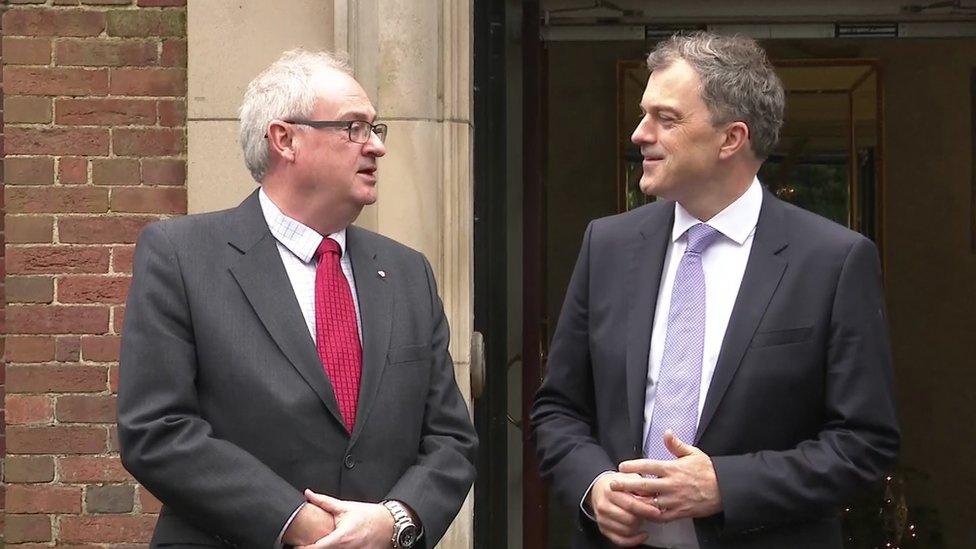
UUP leader Steve Aiken with Secretary of State Julian Smith before talks on Thursday
Before Christmas the DUP was accused of holding back, but it said it had concerns over an Irish language act and reforming the petition of concern.
But that was 2019.
Now it's a new year, the British and Irish governments will be expecting a new way of thinking, given the three-year anniversary of Stormont's collapse is fast approaching.

SDLP leader Colum Eastwood said it was time for politicians to "stop coming to the microphone and telling the people at home they want to do a deal.
"It's time for them to actually do a deal, to get on with it, to get back to work, because I think that's what the public wants - I know that's what the health care workers want," he said.
He said his party had put forward proposals to reform the petition of concern.
"I do think the British government will call an election on 13 January if there's no deal, so the timeline around that is pretty obvious," he added.
Speaking earlier on the Good Morning Ulster programme, Alliance Party leader Naomi Long said the talks had faltered over the petition of concern.
Mrs Long said proposed reform to the petition had been devised by her party, the SDLP, and the Ulster Unionists, and was accepted by Sinn Féin, as well as the Irish and UK governments - but rejected by the DUP.
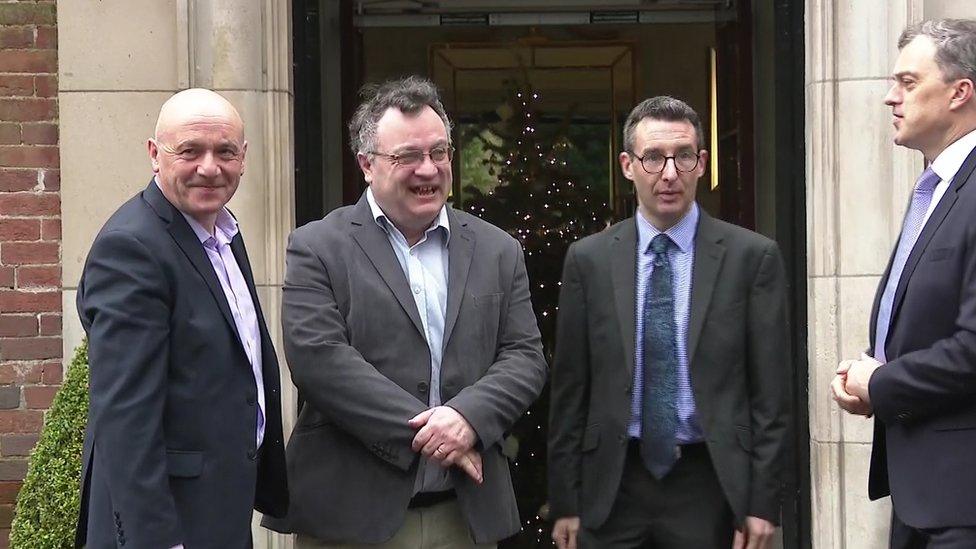
The Alliance Party's John Blair, Stephen Farry and Andrew Muir meeting NI Secretary Julian Smith ahead of Thursday's talks
She said without reforms to the petition, "you might as well open your diary now and pencil in a crisis in four or five months time, because that is exactly what will happen".
Before the talks were paused, Northern Ireland Secretary Julian Smith said the parties and the British and Irish governments were "very close" to a deal.
But he said not all parties were "on board".
Why is the talks deadline 13 January?
Since Stormont collapsed, civil servants have been running day-to-day operations - but have needed Westminster to pass some legislation for some areas they do not have powers over.
In July, the government extended a law that gives civil servants flexibility to take certain decisions, but that runs out on 13 January 2020.
The government then has two options if devolution is still not restored: bring forward another new bill to push back the date, or call a fresh assembly election.
In the past, it has opted to pursue legislation but the current Secretary of State Julian Smith has insisted he will call another poll if the parties do not reach a breakthrough by 13 January.
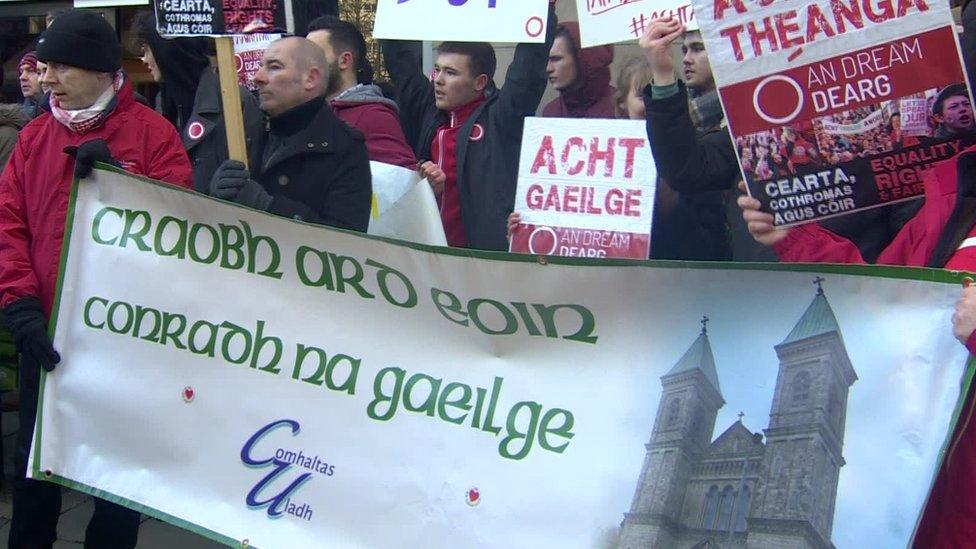
There have been numerous calls for an Irish language act to be implemented in Northern Ireland
What is the stumbling block?
After power sharing fell in January 2017, Sinn Féin said it would not go back into an executive with the DUP, unless legislation for an Irish Language Act is implemented.
The language is seen as important to the wider nationalist community, and a small number of unionists, as a symbol of identity - but in turn, it has been vigorously resisted by unionist parties.
In February 2018, it appeared a deal was about to be brokered - but it collapsed at the last moment, and the two parties disagreed on the content of the proposed agreement text.
Irish language is certainly an issue in the current talks, but it is understood that the main bone of contention relates to reforming the petition of concern.
The DUP has said it will not allow "cherry picking" of the assembly mechanism - but other parties have put forward proposals to change how it operates.
- Published16 December 2019
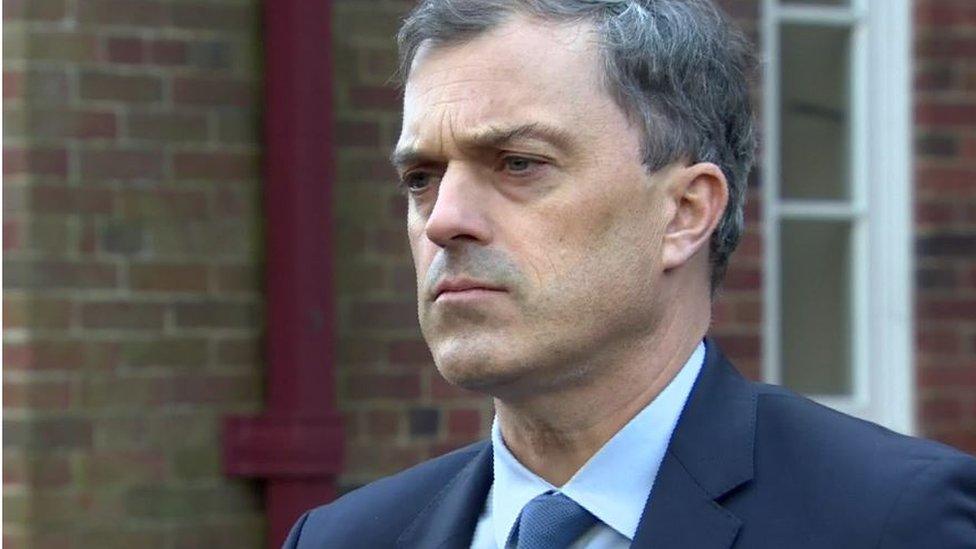
- Published21 October 2019
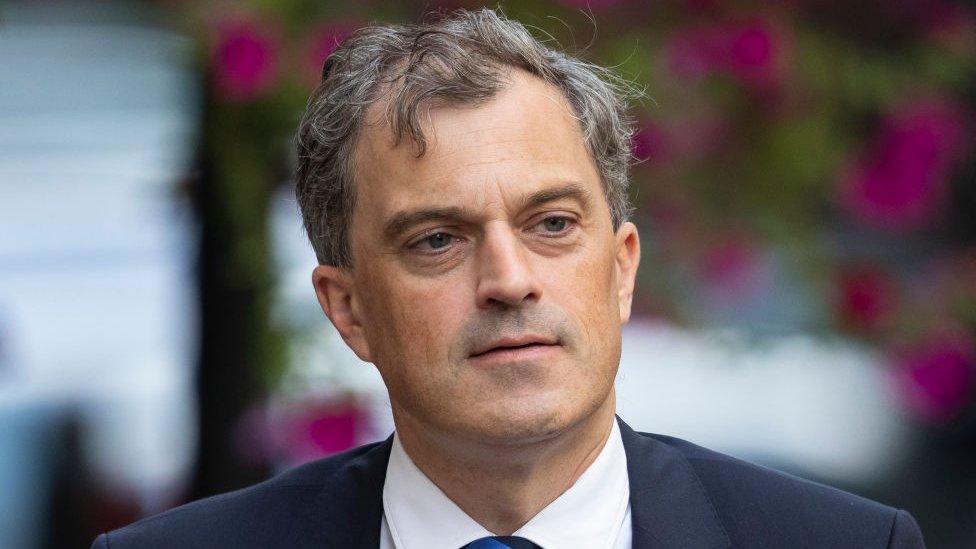
- Published14 December 2019
